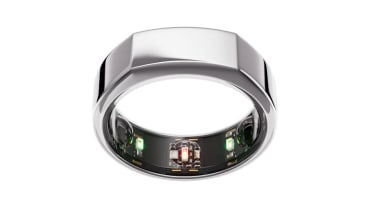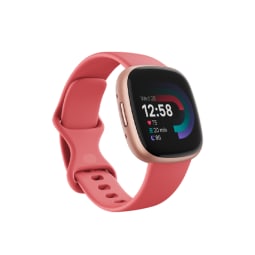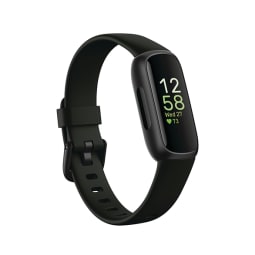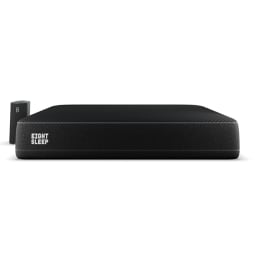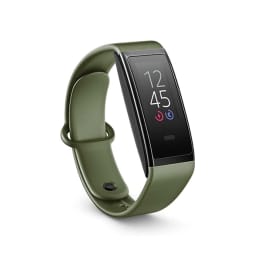While not 100% accurate, sleep tech is becoming more advanced by the day, and there are a bunch of exciting new products available for the data-curious. To help you discern which ones are worth your time and money—and which ones are total snoozers—we consulted two board-certified sleep medicine specialists: Michael Breus, Ph.D., and Nishi Bhopal, M.D. They helped us find the top trackers on the market and explained how to use them to achieve your best rest. Let’s start with the tracker’s design: A sleek ring that’s hardly bigger than a wedding band but packed with ultra-sensitive sensors to measure body temperature, pulse, and movement throughout the night. It then estimates how much time you spend in deeper sleep stages like REM to assign you a sleep score on a scale of 100. And it does so pretty accurately. When pitted against a polysomnography (PSG) test, the gold standard for sleep testing in a lab, the latest Oura Ring had accuracy levels up to 92.6% in measuring key sleep metrics. Both Breus and Bhopal trust the discreet ring with their sleep tracking. “I don’t like wearing a watch and find it much more comfortable to wear a ring during sleep, and it’s also one of the more accurate devices at measuring total sleep time and sleep efficiency,” Bhopal tells mbg. Oura rings are designed to be worn all day long, not just during sleep. They also track your temperature and movement patterns during the day to gauge how your body is performing and how much energy you have to give (which it then shows you in a daily Readiness score). The Gen3 version even uses this data to estimate when you might be getting sick and when women can expect to get their period. These readings can be accessed in real time on the Oura app. There, you can see your sleep and readiness scores, how they’ve changed over time, and personalized tips on how you can optimize them moving forward. Oura is also building out a library of educational content on how to interpret the signals your body is sending you while you’re awake and asleep. When you order your first ring, Oura will send you a free sizing kit that includes a few throwaway tester rings. Once you’ve found your size, your ring will arrive with a charging station (it has an impressive seven days of battery life) and access to the Oura app. It’s free for the first six months; then you have to pay $5.99/month. At $299 plus these monthly fees, the Oura is an investment, but for such a small and convenient tracker, it offers unparalleled sleep and health data. If you shell out an extra $9.99 for a Premium membership, your Fitbit will also give you an estimate of how much time you spent in various sleep stages and a report on noise levels. Plus, you’ll get access to Calm’s library of sleep meditations to help you wind down. Another nice feature is you can program your watch to act as your morning alarm so you can minimize other devices in your bedroom. But the real selling point of the Versa 4 is its activity features. A built-in GPS will follow you on your workouts, and heart rate tracking will give you a report on the intensity of your training. You can also play music, make calls, and use Alexa voice assistant from your water-resistant watch, making this a top pick for those who want to work out without their phone on hand. All that moving around during the day will improve your sleep at night! According to in-house testing from the company, people report 32% better sleep quality (based on daytime energy scores, sleep interruptions, and sleep onset) when sleeping on a Pod mattress. However, the company is lacking the sleep metrics accuracy testing of Fitbit and Oura. Of course, there are cheaper ways to track your sleep, but if the prospect of personalizing your temperature and separating your sleep settings from your partner appeals to you and you have the money, it’s worth a shot. Reviewers do note that setup is a bit arduous, and the pod cover is heavy and cumbersome. But once you get it on your bed, you’re all set to track your sleep wearable-free. With that said, its sleep tracking capabilities are pretty basic. The Halo View won’t show you how your sleep score changes over time or offer personalized sleep tips. Reviewers note that its sleep readings can also be hit or miss, and it doesn’t have the same accuracy as the more expensive models on the list. But if you’re looking to dip your toes into the world of sleep tracking (while enjoying lots of other health perks), it’s a solid starter option. You’ll want to consider if any of these bonus metrics are important to you or if you’re really just looking for something to wear to bed. So whatever option you go with, don’t expect it to be perfect. Again, the most accurate gauge of sleep is how you feel in the morning.








